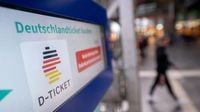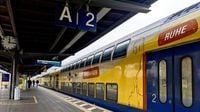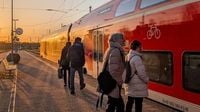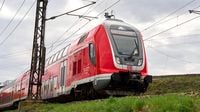Negotiators from Germany’s ruling coalition, consisting of the Union and SPD parties, have recently confirmed their commitment to secure the Deutschlandticket, a subsidized local transportation deal, for the long term. Reports indicate that the current price of 58 euros per month will remain stable throughout 2025 and 2026. However, starting in 2027, the public will likely see a notable price increase as user financing is expected to rise significantly.
The Deutschlandticket has become a crucial part of Germany's public transport infrastructure since its launch, allowing users to travel across all regional and local transport systems at a standardized monthly rate. This initiative, which simplifies fare structures, has been embraced by millions, further solidifying its necessity in everyday commuting for many citizens.
According to sources familiar with the negotiations, a fixed formula for sharing the ticket's financing will be implemented to ensure planning security for users and for the funding bodies at both the federal and state levels. The federal government has been contributing approximately 1.5 billion euros annually to alleviate revenue losses for transport operators. The same amount is also provided by the states, making a total of over three billion euros every year dedicated to maintaining affordable public transport.
Since the successful renegotiation of ticket prices, two consecutive years of stability are planned before users will need to shoulder a greater share of the costs. Federal Minister Christian Bernreiter from the CSU indicated that the arrangement has complexities. In his assessment, the Deutschlandticket was initially a federal initiative, so it is appropriate for the federal government to carry the full financial load moving forward.
As negotiations continue, political dynamics reveal diverging views among the stakeholders. Some leaders within the Union have raised concerns, suggesting that the funding reflects inherent construction flaws in the program. Critics argue that the apparent discount façade previously enjoyed by subscription holders in public transport could lead to inequities between rural and urban transit users.
The SPD, on the other hand, celebrates the Deutschlandticket as a significant success that must be preserved. They emphasize reliability in public transport over future uncertainties and firmly believe that keeping the price fixed contributes to the ticket's ongoing success.
The proposals coming from negotiations are not finalized yet and remain contingent on financing approval. The working group's reports highlight that the broader goal surrounding public transport involves modernizing and enhancing infrastructure, pointing towards a future not only focused on cost but also service improvement.
Environmental organizations have also weighed in, with Greenpeace expressing cautious optimism regarding the continuity of the Deutschlandticket. While they acknowledge the benefits of preserving this program, they warn that unanticipated price hikes could detrimentally affect current subscribers. Lena Donat, a transport expert from Greenpeace, remarked, “It is good that Union and SPD recognize what a treasure they have with the Deutschlandticket and want to continue it,” but she cautioned against overwhelming citizens and potentially jeopardizing about 14 million subscriptions.
The ongoing discussions and tentative agreements demonstrate the coalition's commitment to keeping public transport affordable while preparing users for future cost changes. The approach aims for an enhanced and socially responsible public transport system that caters to both urban and rural needs.
As the coalition continues to navigate the complexities of funding and financing structure of such an essential service, it faces the task of balancing user needs with fiscal realities. The outcomes of this dialogue will have lasting implications for Germany's public transport landscape, influencing everything from commuter behavior to the overall economy.








